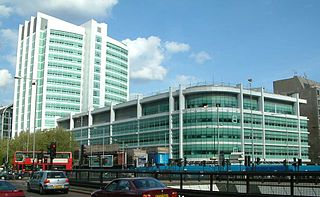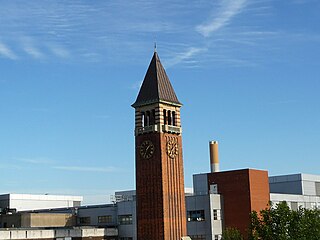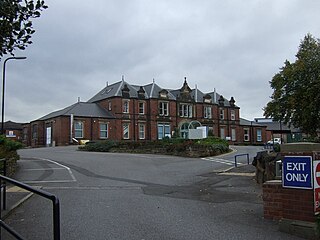
University College Hospital (UCH) is a teaching hospital in the Fitzrovia area of the London Borough of Camden, England. The hospital, which was founded as the North London Hospital in 1834, is closely associated with University College London (UCL), whose main campus is situated next door. The hospital is part of the University College London Hospitals NHS Foundation Trust.

The Royal Oldham Hospital is a NHS hospital in the Coldhurst area of Oldham, Greater Manchester, England. It is managed by the Northern Care Alliance NHS Foundation Trust. The hospital has its own volunteer-run radio station, Radio Cavell, which broadcasts at 1350 AM.

The Countess of Chester Hospital is the main NHS hospital for the English city of Chester and the surrounding area. It currently has 625 beds, general medical departments and a 24-hour accident and emergency unit. It is managed by the Countess of Chester Hospital NHS Foundation Trust, one of the first Foundation Trusts in the UK, formed in 2004. Cardiac rehabilitation services at the hospital are provided by Cheshire and Wirral Partnership NHS Foundation Trust.

Manchester Royal Infirmary (MRI) is a large NHS teaching hospital in Chorlton-on-Medlock, Manchester, England. Founded by Charles White in 1752 as part of the voluntary hospital movement of the 18th century, it is now a major regional and national medical centre. It is the largest hospital within Manchester University NHS Foundation Trust, and based on its Oxford Road Campus in South Manchester where it shares a site with the Royal Manchester Children's Hospital, Manchester Royal Eye Hospital and Saint Mary's Hospital as well as several other educational and research facilities. The Hospital is also a key site for medical educational within Manchester, serving as a main teaching hospital for School of Medical Sciences, University of Manchester.

North Manchester General Hospital (NMGH) is a large NHS hospital in Crumpsall, North Manchester, England. It is operated by Manchester University NHS Foundation Trust. There is an accident and emergency unit, together with a maternity unit, high dependency unit and a mental health wing. A plan to rebuild the hospital was announced by Boris Johnson in the 2019 General Election campaign, and in November 2020 a £54 million funding bid for improvement works was made by the Trust, Manchester City Council, and Manchester Health and Care Commissioning.

The Royal United Hospital (RUH) is a major acute-care district general hospital in the Weston suburb of Bath, England, which lies approximately 1.5 miles (2.4 km) west of the city centre. The hospital has 565 beds and occupies a 52 acres (21 ha) site. It is the area's major accident and emergency hospital, with a helicopter landing point on the adjacent Lansdown Cricket Club field. The hospital is operated by the Royal United Hospitals Bath NHS Foundation Trust.

The Royal National Hospital for Rheumatic Diseases is a small, specialist NHS hospital on the Royal United Hospital (RUH) site in the northwestern outskirts of Bath, England.

Seacroft Hospital is based in York Road in the area of Seacroft, Leeds, LS14 West Yorkshire, England and is operated by the Leeds Teaching Hospitals NHS Trust.

The University Hospital of South Manchester NHS Foundation Trust is a defunct NHS foundation trust that previously operated Wythenshawe Hospital, a major acute teaching hospital in Wythenshawe, Manchester. Many of the services and facilities previously at Withington Hospital were transferred to Wythenshawe in 2004. It provided services for adults and children at Wythenshawe Hospital and Withington Community Hospital. It runs Buccleuch Lodge Intermediate Care Unit and the Dermot Murphy Centre in Withington, and the Specialised Ability Centre in Sharston.
University College London Hospitals NHS Foundation Trust (UCLH) is an NHS foundation trust based in London, United Kingdom. It comprises University College Hospital, University College Hospital at Westmoreland Street, the UCH Macmillan Cancer Centre, the Royal National ENT and Eastman Dental Hospitals, the Hospital for Tropical Diseases, the National Hospital for Neurology and Neurosurgery, the Royal London Hospital for Integrated Medicine and the Royal National Throat, Nose and Ear Hospital.

Medway Maritime Hospital is a general hospital in Gillingham, England within the NHS South East Coast. It is run by Medway NHS Foundation Trust. It is Kent's largest and busiest hospital, dealing with around 400,000 patients annually. It was founded in the early 1900s as a Royal Naval Hospital for naval personnel at Chatham Dockyard and the nearby Royal Naval Barracks.

James Niven was a Scottish physician, perhaps best known for his work during the Spanish Flu outbreak in 1918 as Manchester's Medical Officer of Health. He held that position for 28 years (1894–1922), until he retired. He had previously been Oldham's Medical Officer of Health. He lectured in Public Health in Manchester. He died by suicide in 1925.
The "Greater Manchester Model" of NHS health care was a system uniquely devolved within England, by way of close integration with the Greater Manchester Combined Authority and local authorities, led by the Mayor of Greater Manchester. In July 2022 the Greater Manchester integrated care system took over responsibility for health and social care in the conurbation. The financial plan for 2022–23 had an initial shortage of £187 million.

Heartlands Hospital, formerly EastBirmingham District Hospital, is an acute general hospital in Bordesley Green, Birmingham, England. It is managed by University Hospitals Birmingham NHS Foundation Trust.
Health in Manchester is among the poorest in the country. Manchester and the surrounding areas have been notorious for their poor health since the eighteenth century.
Monsall Hospital was a hospital in North Manchester, England.

New Cross Hospital was a hospital in the New Cross district of south east London, open from 1877 until around 1991.
Health Innovation Manchester is an academic health science centre established in October 2017 to drive innovation in healthcare in Greater Manchester. It is closely associated with the Greater Manchester Health and Social Care Partnership.

The Kendray Hospital is a health facility on Doncaster Road, Barnsley, South Yorkshire, England. It is managed by South West Yorkshire Partnership NHS Foundation Trust.
The Northern Care Alliance NHS Foundation Trust (NCA) is an NHS foundation trust in Greater Manchester, England.















